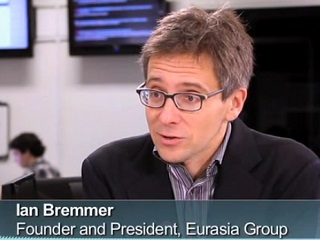Ian Bremmer on Climate Change

Going back to Ian Bremmer, his main focus is understanding the overall trends that shape the future of the world, and, of course, climate change is one of them. Another is his term “G Zero,” meaning the growing power vacuum associated with the fall of the American Empire (I.e., the G7 is obsolete and the G20 never had a chance, being so mired with confusion and conflicting interests.)
Merging these two ideas together yields some powerful, if terrifying, ideas. Bremmer explains why the U.S. is doing so little in this regard, and how inevitable a considerable level of suffering is as a result, at least in terms of climate refugees from the poorer island nations, and droughts that expand in both duration and severity.
He goes on to explain how, though most of the effects of climate change are negative, there are some positive consequences as well: the opening to navigation of the Northwest Passage, providing access to oil and other resources in the Arctic, the longer growing seasons in the north, the emergence of Greenland as an important destination for agriculture.
As fascinating and erudite as Bremmer is, I have to confess that it makes me a bit angry when intelligent people go on like this. One could argue that there is some element of good in the Taliban too, e.g., keeping ISIS out of Afghanistan, but this is insignificant when balanced against the former’s predilection for Jihad and its horrific treatment of women. As a result, reasonable people don’t promote both sides of a story like climate change or the Taliban.
Maybe I’m oversimplifying, or simply getting too upset over nothing. Both have been known to happen. I’d be interested in readers’ opinions.

I do not understand climate change deniers.
It has been known for well over a century that CO2 is a global warming gas, i.e., that adding CO2 to the atmosphere results in retaining more of the sun’s heat. Of course there are both positive and negative feedback loops, but assuming that negative feedback would prevent excessive warming would indeed be foolish. Moreover, it is clear that the earth is warming.
If the earth’s people could freely and inexpensively migrate, perhaps global warming would not be a catastrophe since people could easily migrate away from negatively impacted areas to areas which become more hospitable because of global warming. However, people cannot freely migrate. Political systems make the migration of large numbers of people difficult or impossible. We can see that now as millions of people are attempting to migrate from war torn areas. Moreover, in the newly hospitable areas, it would be necessary to build new infrastructure, new housing, etc. etc. at prohibitive cost.
Global warming would be a disaster, and most likely it has become inevitable because of delayed action to limit it.
The Gaia Hypothesis or the more general Le Chatalier Principle are still operative on global and micro scale. Political climate change rhetoric will IMO have little effect on the powerful forces of nature. Perhaps massive changes in human inputs to the system can lead to small but measurable changes in the dynamic balance of global systems but this can probably only be achieved by a steep reduction in human population or in a totalitarian government that imposes strict limits on people’s activities for the good of the planet and the pocketbooks of the well connected elite.
Craig,
You are correct when you say Ian Bremmer is an impressive observer and commentator on Geo-political affairs.
However, no observer or analyst is possessed of an infallible crystal ball. Unlike yourself, I don’t think viewing Geo-political or Geo-physical problems through the prism of a fixed political or predetermined ideology a useful method of achieving an objective perspective.
Organizations such as the Heartland Institute may not contain the whole truth, but they may provide some information. Science, even political science, requires careful examination and analysis of all data and information in an unbiased and objective manner. The source of information shouldn’t automatically exempt the relevance, value, or veracity of information.
Transforming scientific hypothesis into a new ‘faith’, with all the restrictions of political, ideological and religions dogma, contradicts the essence of scientific, or indeed any, objective analysis.
Without objective analysis “Crusades” and all passionate advocacy inevitably creates more harm than good. Instead of real progress, effective action will be dissipated into the sort of muddled, confused and ill-conceived talk-fests and time wasting political wrangling that is currently being evidenced.
The concept of climate change as a major problem is a scientific challenge. Assessing the degree to which modern industrial development is a contributing factor also a challenge, as is estimating what effect humans can achieve in modifying climatic events.
Both the media and advocates often mistake ‘weather events’ as evidence of climate change. These sensationalized reports do little to advance knowledge, and only add to skepticism. Likewise, attributing natural ego-physical changes and phenomenon to human iniquities, is also unhelpful.
Determining the effects of climate change, assessing what part humans can play in mitigating any effects, and planning adaptations needed, requires calm, rational and objective analysis.
What’s counter-productive, is passionate ‘Crusaders’ seizing the opportunity to advance extraneous political-ideological agenda’s.
In the face of external threats, a collective can either draw together and while respecting a diversity of opinion work together for the common good, or turn in on itself and out of fear and impotence fight internecine conflicts trying to attach blame and find sacrificial scapegoats, all in an effort to achieve appeasement.
Unfortunately, the latter seems to be the process currently occurring as our democratic processes try to cope with frustration and fragmentation.